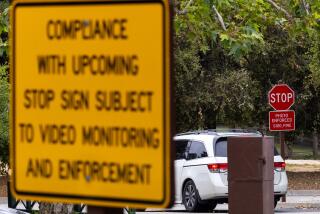Ticket quotas end in Illinois after governor signs new law
- Share via
The policy of assigning quotas for the number of traffic tickets each officer must issue has officially ended in Illinois after Gov. Pat Quinn signed legislation over the weekend.
Good news for some drivers, perhaps. But ending the policy could have an effect on how police in that state are evaluated and even on how much money some municipalities will earn from motorists.
In many jurisdictions, ticket quotas were one of those traditions like doughnuts – always around, but not on top of the desk where visitors could see. Quotas do have an upside since traffic tickets generate income through fines for municipalities. They also serve as an easy performance measuring device for supervisors in police departments, since they are based on verifiable numbers.
But the practice drew the ire of drivers who would often complain – unsuccessfully – that they were victims of an arbitrary rush on the part of police to meet a numerical goal. Some drivers argued that the number of tickets had risen at one point as a means of building public pressure to resolve tense labor negotiations between the police and the city.
Quinn said the law, which was overwhelmingly backed by both houses of the legislature, will allow police to exercise judgment in deciding whether to ticket a driver rather than pursue a fixed number of citations during every shift. The law, which immediately went into effect, applies to local, county and state law enforcement officers.
“Law enforcement officers should have discretion on when and where to issue traffic citations and not be forced to ticket motorists to satisfy a quota system,” the governor said in a news release. “This new law will improve safety and working conditions for police officers and prevent motorists from facing unnecessary anxiety when they encounter a police vehicle.”
The Illinois law applies to the range of citations that police issue, including parking, speeding and other functions. It also specifically bars municipalities from using the number of tickets issued by an officer in performance reviews.
In a statement in April as the measure was still being discussed, John H. Kennedy, executive director of the Illinois Assn. of Chiefs of Police, issued a statement opposing the bill.
“While law enforcement executives strongly agree with eliminating the imposition of arbitrary traffic ticket quotas, the bill would also eliminate vital data-driven performance measures used to assist in the performance appraisal of police officers,” he stated, adding later: “This bill would essentially strip from law enforcement leaders the ability to establish expectations of officers and hold officers accountable for certain minimum performance standards.”
Follow @latimesmuskal for national news.
More to Read
Sign up for Essential California
The most important California stories and recommendations in your inbox every morning.
You may occasionally receive promotional content from the Los Angeles Times.











